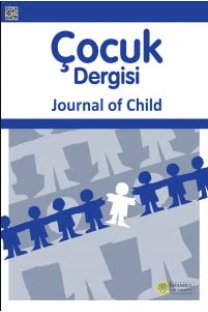Yüz yüze eğitim anne davranışını değiştirebilir mi?
Anneler, Sağlık bilgisi, tutumları, uygulamaları, Anketler, Maternal davranış, Süt çocuğu bakımı
Could face to face training change maternal behavior?
Mothers, Health Knowledge, Attitudes, Practice, Questionnaires, Maternal Behavior, Infant Care,
___
- 1.Unicef. The Basic of Maternal and Child Health 1994: 4.
- 2.TC Hükümeti-Unicef İş Birliği Programı. Türkiye'de anne ve çocukların durum analizi. Ankara; Yeniçağ Matbası, 1991 Nisan.
- 3.Streatfield K, Singarimbun M. Maternal education and child immunization 1990; 27: 447-55.
- 4.İstanbul Türk Tabibler Odası. 2002 UNDP raporu.
- 5.Özvarış ŞB, Akın A. Türkiye nüfus ve sağlık araştırması 1998 ileri analiz sonuçlan. Türkiye Aile Sağlığı ve Planlaması Vakfı yayını 2002; 2.
- 6.Behrman R, Kliegman R, Jenson B. Nelson Textbook of Pediatrics 16 th ed. Philadelphia: WB Saunders, 2000.
- 7.Quigley P, Ebrahim GJ. Can womens organisations bring about health development. J Trop Pediatr 1994; 40: 294-7.
- 8.Erkan S. Doğum öncesi eğitim ve doğuma hazırlık sınıfları. Birinci Ana Çocuk Sağlığı Kongre kitabı 2002; 301.
- 9.Küçükosmanoğlu E, Acar Y, Altınel N, Kaçar A. Doğacak bebeğin emzirilmesi konusunda baba adaylarının yaklaşımı. Çocuk Sağ ve Hast Derg 2001; 44: 349-54.
- 10.Turan M, Coşkun A, Gökçay G. Doğum sonrası erken dönemde doğru teknikle emzirmenin tek başına anne sütü ile beslenme süresine etkisi. İstanbul Tıp Mec 2000; 63: 286-92.
- 11.İnce N. Annelerin emzirme konusundaki bilgileri. PTT Hastanesi Tıp Dergisi 2001; 23: 21-8.
- 12.Kıvanç A. Gazi Sağlık Ocağı bölgesinde 0-6 yaş grubu çocuğu olan annelerin çocuk sağlığı bilgi düzeylerinin tespiti. Optimal Tıp Dergisi 2000; 13: 43-7.
- 13.Arıkan D, Alp H. Erzurum il merkezinde anne sütü verilme oranı, emzirme süresi ve bunları etkileyen faktörler. Türk Hemşireler Dergisi 1997; 47:11.
- 14.Can G ve ark. Çocuk sağlığı ve hastalıkları uzmanı hekimlerin ulusal aşı politikaları ve aşı uygulamaları konusundaki tutum ve davranışları. Sağlık ve Toplum Dergisi 2001; 1: 28-36.
- 15.Emiroğlu HH, Kösecik M, Tatlı MM, Ataş A. Ebeveynlerin aşılama ile ilgili tutumları. Türkiye Tıp Dergisi 1999; 6: 279-80.
- 16.Luman ET, McCauley MM, Shefer A, Chu SY. Maternal characteristics associated with vaccination of young children. Pediatrics 2003; 5: 1215-7.
- 17.Moran CF, Holt VL, Martin DP. What do women want to know after childbirth. Birth 1997; 24: 27-34.
- ISSN: 1302-9940
- Yayın Aralığı: 4
- Başlangıç: 2000
- Yayıncı: İstanbul Üniversitesi
Yüz yüze eğitim anne davranışını değiştirebilir mi?
Selda HIZEL, CİHAT ŞANLI, Reyhan BULDUK
Miyoklonus-opsoklonus-ataksi ile başvuran nöroblastom vakası
Arzu AKÇAY, Gönül AYDOĞAN, Ferhan AKICI, Zafer SALCIOĞLU
Kostmann sendromu: Vaka sunumu
YALÇIN ÇELİK, Bahar SALİHOĞLU, Sami HATİPOĞLU, Aysun KARADAĞ, Vefik ARICA
Alt solunum yolu infeksiyonu olan çocuklarda yatış süresi ile ilişkili faktörler
ELİF ÇOMAK, Ahmet R. ÖRMECİ, Sema KIRBIYIK, Ayşen TÜREDİ
Yenidoğanın gastrointestinal perforasyonları
Mustafa OKUMUŞ, Tansu SALMAN, Alaaddin ÇELİK, Abdülkerim TEMİZ, Hüseyin ÖZBEY, Feryal GÜN
Konjenital müsküler tortikolis: Erken ve yoğun fizyoterapide aile uyumu ile tedavi başarısı
Erhan GÜLTEKİN, Özahi İlke İPEK, Cengiz ÇELİKYURT, Cavit AYDOĞDU, Semra YAPICI
Demir eksikliği anemisi ve zeka üzerine etkileri
Leyla AĞAOĞLU, Oktay TORUN, Yasemin SEFİL, Dilek DEMİR, Emin ÜNÜVAR
Perran BORAN, Gülnur TOKUÇ, Sedat ÖKTEM
Travmatik doğum vakalarının değerlendirilmesi
Pınar TURHAN, Aysel KIYAK, Nur CANPOLAT, Nuray A. AYAZ, Belgin T. AKTAŞ, Gönül AYDOĞAN, Orhan KORKMAZ, Güngör TEKOĞUL, Işın KILIÇASLAN, Veli UYSAL, Seyhun SOLAKOĞLU
